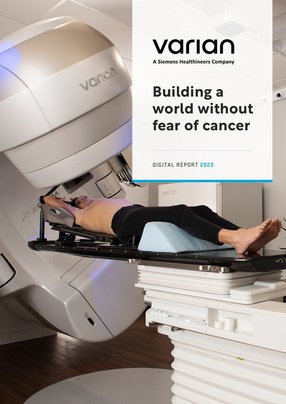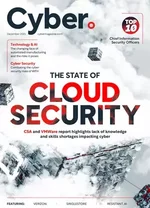Global oncology company Varian, now part of Siemens Healthineers, is dedicated to creating a ‘world without fear of cancer’. Headquartered in Palo Alto California, USA, it has 10,000 employees globally.
Rebecca Cortiula is the Senior Managing Director for Varian Australasia, based in Sydney. She is responsible for improving access to radiation therapy for cancer patients in Australia and New Zealand.
Rebecca entered healthcare in 1992 as a hospital scientist at a blood bank. She says the environment has changed remarkably since.
“Some of the big changes I’ve seen are in automation and the reduction in manual and repetitive tasks within hospitals,” says Rebecca. “I used to work in the laboratory system. The industry has moved from people in lab coats manually running tests to machines that can run multiple tasks within one system.”
Patients are also more engaged in their healthcare today. Access to large amounts of healthcare information means they can take a more active role.
“We’re ensuring that patient feedback is central to decisions around care,” explains Rebecca. “There is a multi-disciplinary component to that, where physicians with different areas of expertise have to come in. They make decisions on the best treatment options for a patient, taking patient preferences into account along the way.”
Remaining agile in such an environment is vital, so Rebecca is always looking to learn from new ideas and approaches. She undertook years of study prior to entering the workforce, first studying biochemical science at The University of Technology Sydney. Now Rebecca is studying a Master’s degree in Health Economics.
“My kids think I’m way too old to be at uni,” laughs Rebecca. “Continued learning and continuing to add value to the business and to customers – that is what motivates me. We are very fortunate in Australia that we’re able to access continued education. The landscape in healthcare is changing and a growth mindset is a major competitive advantage.”
“It helps you be comfortable taking personal risks and striving for higher stretch goals. That generally leads to higher motivation and development, which means lower stress, lower anxiety, lower chances of depression and a higher performance overall. It helps you come up with new ideas and novel solutions for patient care.”
Rebecca is conscious to take care of her wellbeing while managing multiple priorities. “I try to make sure that I get fresh air and sunshine every day - even 15 minutes at lunchtime,” she says. “I do try to get a walk in each morning. I'll listen to a podcast and gather some new perspectives. At bedtime, I’ve got to wind down and I do that by reading. The only screen time I have is my Kindle, then I can switch off and get a decent night's sleep.”
While the healthcare environment has evolved, some things remain frustratingly similar. Gender diversity is one area that needs greater attention. “I was looking at the latest gender gap report, and unfortunately we appear to have gone backwards. We won’t close the gap for another 125 years – which is a really scary statistic. I think it’s so important to understand bias and ensure all groups are treated equally, whether in our organization or in society in general.”
“If we can't have equity for 50% of our population, how are we ever going to move the dial on diversity overall and ensure we have equitable treatment for minority groups within our society? I’m Chair of the Medical Technology Associations Women in MedTech Committee. We focus on promoting the benefits of gender diversity within the workplace, providing tools and support to MedTech companies.”
Building a world where cancer doesn’t hold the fear it does today
By 2050, some experts think it will be possible to make cancer a manageable disease, similar to diabetes. “A cancer diagnosis will no longer hold the fear it does today - both for the patient and for their families. There’s a lot of emerging treatments that have the potential to deliver better treatment outcomes and improve both the convenience and the quality of life for cancer patients.
“It requires a multidisciplinary approach: radiation therapy, surgery, pharmaceuticals, in-hospital care, outside of hospital care. That continuation of care is really important for the patients and relies on the whole healthcare ecosystem working together and understanding where we fit into that continuum of care for the patient.”
Ensuring radiation therapy is part of this care continuum is central to Rebecca’s role, both from a financial and moral point of view. “Ultimately the responsibility is to ensure that we have a health care system that's sustainable and can continue to provide some of the best healthcare outcomes in the world for every dollar spent in Australia and New Zealand.”
“As a business, while we have a responsibility to deliver on financial metrics, we also have to deliver on customer satisfaction and employee engagement.”
Rebecca says this dedication to customer satisfaction stood out to her during the pandemic. “For me, I’ve learned just how far we are willing to go to ensure there is continuity of care,” says Rebecca.
“Many of the ANZ team have gone over and above during this pandemic - some of our team endured hotel quarantine to ensure there was no disruption to supporting our customers and patients. That was amazing!
“A lot of innovative ideas came through the team during this time. We’ve worked with the Australian Society of Medical Imaging and Radiation Therapy to create a registry of licensed radiation therapists, including Varian employees, to support departments. There was concern that teams would have to go into lockdown if there was a major outbreak in a hospital. To avoid a human resource crunch, this database was created to see if another radiation therapist would be needed to step in.”
Varian also worked with its partners to help the next generation of radiation therapists continue their education, ensuring there is not a knock-on effect to the supply of oncology professionals.
“There was a chance that university students were going to see a delay in their ability to graduate as radiation therapists because they weren’t able to complete some of their clinical training,” said Rebecca. “Our training team provided tutorials to over 120 students across four universities to make sure they would be able to graduate on time.”
Partnerships are pivotal to treatment continuity and access to care
Rebecca says Varian knows it cannot achieve its ambition without the right partners. Varian Australia works with the Peter MacCallum Cancer Centre, a leading cancer research, education and treatment hub in Australia. “We have a longstanding research and development partnership with them. A couple of years ago, we moved to having a managed service with them,” explains Rebecca.
“Radiation therapy requires a lot of planning. Once it’s recommended as part of a cancer patient’s treatment, specialists work out the best way to deliver the highest possible dose to the tumor while avoiding healthy cells. This requires a lot of data. Our software and the work we did with Peter McCallum Center in Victoria allowed them to do all of that work remotely.”
“We took on some of the responsibility around their IT infrastructure and software, ensuring they’re up and running at all times, and that safety and security systems are in place. This allowed us to bring the remote planning solutions to them during the pandemic period, making sure the highest quality of care continued for their patients.”
While remote care has obvious advantages, it has also made cyber security a priority for the business. “Recent cyber-attacks have really highlighted the impact on treatment continuity,” says Rebecca.
“For us this is an extremely important topic. It’s a critical focus to protect the integrity of patient information. We are collaborating with our partners to ensure our patient information remains secure. We do regular upgrades to ensure the latest security measures are in place, we have systems that isolate customer segments, we have measures in place to prevent cyber leaping between silos of information, and then we also have systems that minimize the downtime if a customer system is attacked to ensure we get them back online as quickly as possible.”
Varian provides cancer centres with software products for managing the patient's journey from diagnosis to survivorship. “This software contains lots of tools and features that allow clinicians to work remotely and collaborate between clinics and healthcare systems,” explains Rebecca.
“In the past, for rarer types of tumours, patients might have to travel greater distances to get to a centre with the expertise to manage that challenge. These remote solutions mean the information can be shared. Location is no longer a major barrier to access. What we discovered was that these remote solutions could be implemented in the pandemic as a way of managing the workflow. It does mean that remote areas are not disadvantaged when it comes to accessing cancer treatment. E-Health is now an option for patients.”
For those who still need to travel, Varian Australia works with the Sony Foundation, which provides young cancer patients with accommodation and support during their treatment. “Regional Australians do have, unfortunately, greater challenges getting access to radiation therapy. So we've partnered with them to provide some funding for their accommodation, and we get to know their background and create a kind of care package for them with magazines and food from the local area. It just lets them know there are other people out there who care about what's happening.”
Support from Siemens will allow for a more comprehensive cancer care offering
In April 2021, Siemens Healthineers completed their acquisition of Varian. Cortiula believes the two companies can drive faster progress in cancer care together. “It means we can fast-track our vision for a world without fear of cancer,” said Cortiula. “It allows us to ensure the best outcomes can be reached by combining people, technology and data. Siemens has some of the best imaging technology available. I see this as an opportunity to really accelerate our product development.”
So, what does the future hold for the combined businesses? “Varian’s approach is still centered around intelligent cancer care and driving progress for cancer care for the next 30 years and beyond,” says Rebecca. “I see us accelerating our use of software automated processes and helping oncology professionals collaborate and develop more precise and holistic cancer treatments. We’ll see greater cooperation between research institutions oncology practices. Multi-disciplinary teams working together with a whole of care approach, so that no matter where the patient is located, they can get access to the best possible quality care. ”
- Are smart medical devices causing cyber security threats?Cyber Security
- Cryptojacking hits industry hard and hospitals could be nextOperational Security
- Ordr partners with Sodexo on healthcare cybersecurityCyber Security
- 86% of healthcare cloud attacks result in financial lossCloud Security


